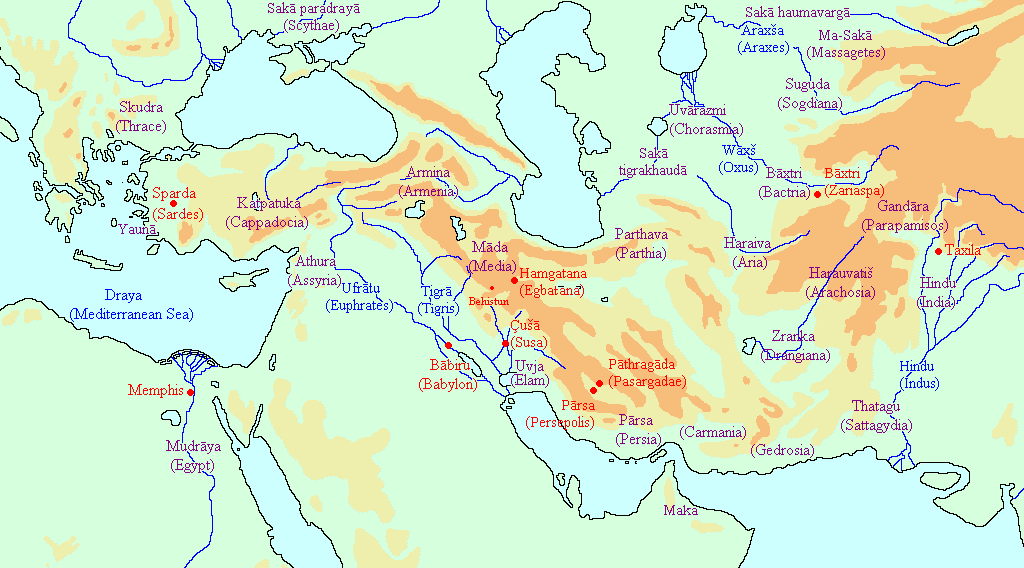|
Cyrus the Great Became Top
Leader Of His Era By Championing Just Rule
Leaders & Success
By Matthew Benjamin
When the conqueror Cyrus the Great rode into Babylon, the city's
vanquished erupted in cheers.
Yes, they'd have to bend to his rule. But Cyrus (580-530? B.C.) made
sure that wouldn't be difficult. In contrast to other rulers of his day,
he was just. In fact, his style of government was a critical factor in
his becoming the greatest ruler of his time.
Cyrus' Persian Empire, which extended from India to the Mediterranean
Sea, was the most powerful state in the world until its conquest two
centuries later by Alexander the Great.
Cyrus was born to nobility in a small highland tribe, the Achaemenians,
in central Persia. The tribe paid tribute to several regional kingdoms,
including Media to the west and Babylonia to the south.
Cyrus' father was a minor king who was venerated in his own lands but
became utterly humble when he visited his more powerful neighbors to
take tributes of wild horses.
Once when young Cyrus went on such a trip to Media, he was bewildered by
his father's reduction in stature. More disturbing to him, however, was
the great cruelty of the Median king, Astyages. According to one
account, Cyrus saw Astyages slay his own general's son as punishment for
the general's minor misdeed.
That same general later betrayed Astyages, causing the king to lose his
authority and possessions.
Such instances taught Cyrus that cruelty and humiliation were not
effective. He decided he would govern through conciliation instead.
Cyrus' first military conquest was of Media in 550 B.C. One of his first
acts was to do away with the draconian tradition that would have had him
raze the city and murder its citizens en masse.
Cyrus appointed a Mede as chief adviser and then ruled the kingdom in a
kind of dual monarchy, with both Medes and Persians holding high
offices. The satrapy, as this system of government became known, put a
native Mede in power as a semiautonomous ruler, or satrap. Cyrus
instituted certain checks, though. For example, several of the satrap's
underlings reported directly to Cyrus.
"Nevertheless, the close
relationship between Persians and Medes was never forgotten. Medes were
honored equally with Persians; they were employed in high office and
were chosen to lead Persian armies," wrote A.T. Olmstead in his
"History of the Persian Empire."
From Media, Cyrus went on to conquer the western land of Lydia and
several Greek states on the Aegean Sea. He then turned east, taking the
ancient kingdom of Drangiana, Arachosia, Margiana and Bactria. He
converted most into satrapies and put natives in command.
He also showed great respect for conquered peoples' religious and
cultural beliefs. At that time, every tribe or kingdom had its own gods
and rites. While it was customary for conquerors to deface the
idols and religious statues of those they defeated, Cyrus forbade that
practice. When it did occur, he quickly remedied it.
"Large numbers of foreign captive divinities gave further
opportunity for royal benevolence," Olmstead wrote. That earned him
the respect and homage of the races over whom he ruled.
Cyrus' biggest conquest was Babylonia, a wildly rich and powerful
kingdom in the fertile crescent between the Tigris and Euphrates rivers.
It was, however, in decline. Babylonian king Nabu-naid was unpopular
with many segments of his population. He had alienated the high priests
and captured and enslaved ten of thousands of Jews.
Cyrus took Babylon, the greatest city of the ancient world, in 539 B.C.
He did so to the cheers of its citizens, who welcomed him as ruler
because of word of his just treatment. He lived up to that reputation,
freeing more than 40,000 enslaved Jews and allowing them to return to
Palestine. He is mentioned 22 times in the Bible for these and similar
deeds.
Cyrus always took pains to convey that he was not a foreign king and
conqueror, but a liberator and, therefore, a legitimate holder of the
crown. For example, after conquering Babylon, he immediately
addressed its citizens in their own language and added "King of
Babylon" to the top of his long list of titles. It was an unheard
of gesture of respect.
"In the eyes of his Babylonian subjects, Cyrus was never an alien
king," Olmstead wrote. "The proclamation of Cyrus to the
Babylonians, issued in their own language, was a model of persuasive
propaganda." He also left
in place most of the existing government and allowed most midlevel
officials to retain their positions.
Cyrus was a great learner. He observed the customs and traditions of the
cultures he conquered and made sure the best elements were put to use
for all of Persia's benefit.
Cyrus invented, or appropriated and improved upon, the idea of the
postal system, according to the Greek historian Xenophon. Figuring out
how far a horse could travel in one day, Cyrus built a series of posting
stations, each one day's ride apart, across his empire. The system
ensured the efficient flow of information between him and his satraps.
|
